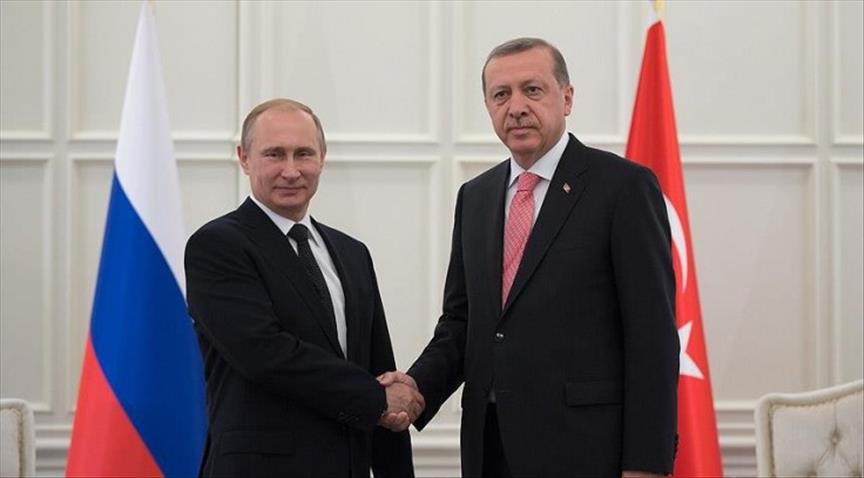The Turkish and Russian gas pipeline project “Turkish Stream” will play a critical role amid the normalizing of relations between the two countries, however experts point out major obstacles which need to be overcome for its success.
The pipeline project, which was announced by Russian President Vladimir Putin in December 2014 during his visit to Ankara, plans to carry Russian gas via Black Sea and Turkey to South Eastern Europe.
Originally planned as a four-way pipeline with an annual transfer capacity of 63 billion cubic meters (bcm), the project’s capacity was later reduced to a two-way pipeline, with a capacity of 32 bcm.
Russian natural gas producer Gazprom's CEO Alexei Miller proclaimed that the reason for reducing the pipeline capacity by almost half was because of a lack of gas demand in Europe.
However, after Turkey downed a Russian jet last November, both sides shelved discussions for the project. Now with the normalization of relations between the countries underway, the project is expected once more to be an important topic on the agenda in talks between the two countries.
“New huge energy infrastructure is the best way to support and strengthen interstate relations for the long term period,” Aleksei Grivach, deputy director of Russia’s National Energy Security Fund told Anadolu Agency.
Although a major consumer of Russian gas, Europe's perspective on the project remains skeptical. The new route would bypass Ukraine, a measure which is of concern to Europe in that Ukraine would lose its revenue from transporting Russian gas through its territories.
“Some European politicians may oppose the project but effectively it doesn’t matter much. Russia and Turkey can agree to develop necessary infrastructure on the Black Sea on bilateral ground,” Grivach said.
The expert further explained that the construction of the first line of the Turkish Stream would be “easy.”
“We need only an intergovernmental treaty and some commercial off-take contracts to be extended for the lifetime of the new offshore pipeline,” he said.
He pointed out that the construction of the second pipeline would have greater difficulties; “It has to be integrated into the European transmission system, which means that new pipelines would have to be built on the EU side."
Grivach underlined that countries such as Bulgaria and Romania would strongly oppose the project, as they would lose their status and income as transit states.
When the Turkish Stream project was announced, another Russian pipeline project, the South Stream, was scrapped. The project would basically follow the same route as the Turkish Stream, but instead of Turkey, the pipeline would enter Europe through Bulgaria.
- “Project to shape Russia – Turkey relations”
Gokhan Yardim, former head of BOTAS and head of Angora Gas Company, affirmed that the Turkish Stream project has the potential to shape relations between Russia and Turkey for the next 20 years.
Underlining that the project could enhance Turkey’s energy security, Yardim said that Turkish private gas importers could also have access to additional gas.
“Currently 30 companies in Turkey import and trade 10 billion cubic meters of Russian gas. An increase of this amount could develop Turkey's gas market,” he said.
Asked whether the potential gas pipeline could affect the development of other pipeline projects in Turkey, such as TANAP, Northern Iraq and Israeli pipelines, Yardim said only TANAP, transporting Azerbaijani gas, could face some effects in the Balkans.
“The direct line of Russian gas to Turkish Stream would only reroute the gas Turkey is already importing via Ukraine. However, the second line of the project to South Eastern Europe could effect TANAP, which would deliver Azerbaijani gas to the same region,” Yardim said, adding that, “However, competition is a good thing.”
- Project's future still unclear
Marcel Salikhov, the head of the economics department at the Moscow-based Institute for Energy and Finance, is more doubtful of the prospects of realizing the Turkish Stream project.
"The European Commission will object to the project. For Gazprom, the top priority is the Nord Stream 2. So most of the lobbying power will be aimed at it," he said.
The Nord Stream 2 natural gas project, which plans to deliver gas with a capacity of 55 bcm beneath the Baltic Sea through a 1,200 kilometer-route to Germany, is currently at the center of political discussions in the EU.
"There is also the question of the cost of the project. Costs were estimated at €11.4 billion," Salikhov said, adding that due to lower gas prices, increased taxation and dividend payouts, the financial capabilities of Gazprom are diminished making it hard for them to finance the project independently.
Salikhov also put further doubts on the project when he said that it would unlikely be finished by 2019 when the transit agreement between Russia and Ukraine ends.
"So it's a matter of fact that Russia and Ukraine will have to negotiate some kind of new contract, therefore it doesn't make sense to rush the Turkish Stream," he asserted.
Although there are major obstacles that need to be overcome before the project can get underway, it will undoubtedly be a main topic of discussion next week on August 9, when Turkish President Recep Tayyip Erdogan meets with Putin in the Russian city of St. Petersburg.
By Emre Gurkan Abay in Moscow
Anadolu Agency
gurkan.abay@aa.com.tr


